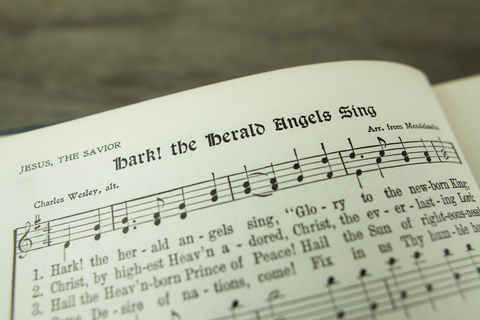Charlton Rhinehart
There is a small church that I would often visit with my family as I was growing up when we were traveling in middle Tennessee. The church was sound in the faith, the preacher would always work up a sweat preaching though it was not to make a show, and the usual song leader would always lead “No Tears in Heaven”. You could always count on that song being sung every Sunday, yet it was always sung with enthusiasm. I have grown quite fond of that song because of the memories it gives me of that good congregation. I do believe there is a sense in which there are no tears in heaven, but the more I think about it I also realize that there has to be some tears in heaven, and those tears are not just tears of joy.
The passage that this song about no tears is getting at of course is the one in Revelation 21 when the new Jerusalem appears, perhaps describing heaven or a brighter picture of when the persecutions would be over. The passage says: “and He shall wipe away every tear from their eyes; and there shall be no longer be any death; there shall no longer be any mourning, or crying, or pain; the first things have passed away” Rev 21:4 NASB. A similar passage is in chapter 7 v.17 of Revelation also describing a time when “…God shall wipe every tear from their eyes”. Hold that thought of such a bliss place and the context it comes from in Revelation in the back of your mind for a moment while we consider another thought.
I don’t like to speculate beyond scripture very much, but have you ever stopped to think about the thoughts of a person in heaven or paradise as they first awake there? If you have lost someone close perhaps you knew their situation and their concerns very well. We can imagine the sights of the glory of heaven though we really don’t understand all that will be, we can imagine the beauty of the singing that is there, the joy of being with past saints who have passed before us, the longing that will be fulfilled to be in the presence of God and to see the Son at His right hand. Even if Paradise is where we first go awaiting heaven we can still imagine the amazement that will be in such a place like Lazarus saw in Luke 16. But again if you have in mind someone who has passed on before us, you also know of their earthly concerns: their family, their spouse, their children, and grandchildren. How could a person not be mindful of their loved ones that they had to leave behind? Regardless of how amazing the scenes of heaven are, a person will still think of their close loved ones and long for them to be there also.
When a person enters eternity there is bound to be some sadness. There will be a great concern, sadness, and tears for the situation we left our family in behind us. There will be sadness for the ones who should be there waiting for us in heaven but are not there. There will be heartache for the ones still living who we know are on a track to miss such a beautiful place. There will be worry for our children and loved ones who we hope will be faithful without us there who we hope to see again, and there will be great sorrow as many of those loved ones never show up as time progresses. There will be great joys in heaven that we on earth cannot truly fathom, but there will also be sadness and tears – because there has to be.
Perhaps the statement that there has to be tears and some sadness there in heaven catches you off guard. It seems to violate scripture of the few passages that describe heaven to us. But consider also who else lives there in heaven, the Father, the Son, and the Spirit. Are they ever sad? Are they ever grieved or hurt or are they simply in a constant state of pleasure? We know that God experiences sadness and heartache. We know that God was hurt, saddened, and angry when Israel were adulterous with idolatry and disobedience, and we know that He feels the same in heaven when the church acts similar today. We know that the Son is reminded of His pain when those leaving the faith trample on Him and the blood that was shed for them (Heb 10:29). We know also that we can grieve the Holy Spirit (Eph 4:30), that grief is felt there in heaven, and it resonates through the angels and the multitude that is there as all heaven longs to see the plans of God unfold. There will be joy, peace, and happiness in heaven let’s not forget, but we have to keep in mind the context and the actual meaning behind the promise of no more tears.
Coming back to the thought of the bliss of heaven described in Revelation we need to remember how symbolic Revelation is written. Just like Ezekiel and portions of Daniel, Revelation is full of very symbolic language different than many parts of Scripture. For example in chapter 12 we have a dragon who we are told is Satan, 12:3, 12:9. In Revelation chapter 18 Babylon is destroyed despite Babylon having been destroyed 600 years earlier and never in history returning. In chapter 11 the temple is being measured though it was destroyed in AD 70, yet John likely wrote the book of Revelation in AD 90. There is reference also to the tabernacle which had been replaced by the temple for thousands of years. Is Satan really a dragon? Did Babylon get rebuilt somewhere along the way or did a host of other Old Testament figures become a physical item again in New Testament times? Of course many of these analogies from Revelation were not literal or physical items; these things are simply imagery familiar to the saints depicting the trails and persecutions that they are going through as the Roman Empire persecuted the church in so many ways. Such it is with the promise of no tears, if we only understand that to mean what it literally says, then we are missing the point of a symbolic text of scripture.
Heaven is not a place where we will be in just an ignorant state of bliss. I think one of the main reasons we tend to think this way is because we misunderstand the Revelation passage and make the symbolic text a physical requirement for heaven. When we read of no crying, or pain, or mourning then we think of a person in just a lost state of happiness. We think that our memory we will somehow be erased of the bad things that happened, and we ask foolish questions like, “will we recognize each other there?” Of course we will know one another, just think of the transfiguration and the prophets who knew one another on that mountain. We often have this foggy picture of heaven in our minds, where our thoughts are limited and our knowledge is impaired like a happy person lost in a nursing home. The scriptures show we will have knowledge of what is happening and the memories of all that has taken place, even in Revelation the slain saints show this awareness as they ask ”how long, O Lord, holy and true…?” asking when their blood will be avenged (Rev 6:10-11).
You see the picture that is being presented of eternity is not one where we are impaired and deceived into happiness, but rather this is a place where the pains of our fallen world no longer threaten us. It is a place where we come to a full understanding, a place where we reign with Christ having overcome the persecutions of the world. I believe there will be tears in heaven, tears of sadness, feelings of worry and concern, but those things are only there because of the troubles of our world. Our feelings, our memories, and our existence will be every bit as present to us then as they are to us today, but the trials of this fallen world will be over for those who overcome. When we realize what God meant when he told us of a place with no more tears in the context that He did, that is when we long for such a place. When we realize what having no tears represents, we see a clearer picture of heaven and understand better what we labor for. I look forward to such a place with no more pain.
And I heard a loud voice from the throne, saying, “Behold, the tabernacle of God is among men, and He shall dwell among them, and they shall be His people, and God Himself shall be among them, and He shall wipe away every tear from their eyes; and there shall no longer be any death; there shall no longer be any mourning, or crying, or pain; the first things have passed away.” Revelation 21:3-4











